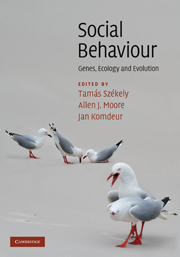Book contents
- Frontmatter
- Contents
- List of contributors
- Introduction: The uphill climb of sociobiology: towards a new synthesis
- Profile: Undiminished passion
- Part I Foundations
- Part II Themes
- 7 Aggression: towards an integration of gene, brain and behaviour
- Profile: From behavioural observations, to genes, to evolution
- 8 Social influences on communication signals: from honesty to exploitation
- Profile: Reputation can make the world go round – or why we are sometimes social
- 9 Important topics in group living
- Profile: A haphazard career
- 10 Sexual behaviour: conflict, cooperation and coevolution
- Profile: In celebration of questions, past, present and future
- 11 Pair bonds and parental behaviour
- Profile: Mating systems and genetic variation
- 12 Adaptations and constraints in the evolution of delayed dispersal: implications for cooperation
- Profile: Selections from a life in social selection
- 13 Social behaviour in microorganisms
- Profile: The de novo evolution of cooperation: an unlikely event
- 14 Social environments, social tactics and their fitness consequences in complex mammalian societies
- Profile: Evolutionary genetics and social behaviour: changed perspectives on sexual coevolution
- 15 Social behaviour in humans
- Profile: Genes and social behaviour: from gene to genome to 1000 genomes
- Part III Implications
- Species index
- Subject index
- References
Profile: Reputation can make the world go round – or why we are sometimes social
Published online by Cambridge University Press: 05 June 2012
- Frontmatter
- Contents
- List of contributors
- Introduction: The uphill climb of sociobiology: towards a new synthesis
- Profile: Undiminished passion
- Part I Foundations
- Part II Themes
- 7 Aggression: towards an integration of gene, brain and behaviour
- Profile: From behavioural observations, to genes, to evolution
- 8 Social influences on communication signals: from honesty to exploitation
- Profile: Reputation can make the world go round – or why we are sometimes social
- 9 Important topics in group living
- Profile: A haphazard career
- 10 Sexual behaviour: conflict, cooperation and coevolution
- Profile: In celebration of questions, past, present and future
- 11 Pair bonds and parental behaviour
- Profile: Mating systems and genetic variation
- 12 Adaptations and constraints in the evolution of delayed dispersal: implications for cooperation
- Profile: Selections from a life in social selection
- 13 Social behaviour in microorganisms
- Profile: The de novo evolution of cooperation: an unlikely event
- 14 Social environments, social tactics and their fitness consequences in complex mammalian societies
- Profile: Evolutionary genetics and social behaviour: changed perspectives on sexual coevolution
- 15 Social behaviour in humans
- Profile: Genes and social behaviour: from gene to genome to 1000 genomes
- Part III Implications
- Species index
- Subject index
- References
Summary
Reciprocity is the secret of our success, even though two unrelated individuals sometimes find it difficult to cooperate. They may mutually reciprocate help, if they know they will meet again. However, there is always the temptation not to return the help to the donor. Using a strategy such as Tit-for-Tat (see Chapter 4) can minimise the risk of being the sucker in the end, but there is no guarantee. To achieve cooperation seems hopeless when groups of three or more unrelated individuals need to cooperate in order to maintain a common resource: the resource is usually overused and collapses, as do fish populations as a consequence of over-fishing, and the global climate as a consequence of unrestricted use of fossil energy. The latter is regarded as the greatest challenge to humankind. The tragedy of the commons, as Hardin (1968) called this kind of social dilemma (see Chapter 6), appears inevitable – free access to a public resource brings ruin to all.
The so-called Public Goods game has been invented as a paradigm to study tragedy of the commons situations experimentally. For example, a group of four volunteers is asked to supply one euro each to a public pool, which is then doubled and redistributed among the four players irrespective of whether they have contributed. If all contribute, each has a net gain of one euro. However, a single defector has a net gain of 1.50 euro whereas each of the three contributors gains only 50 cents. Why should you cooperate?
- Type
- Chapter
- Information
- Social BehaviourGenes, Ecology and Evolution, pp. 200 - 202Publisher: Cambridge University PressPrint publication year: 2010



